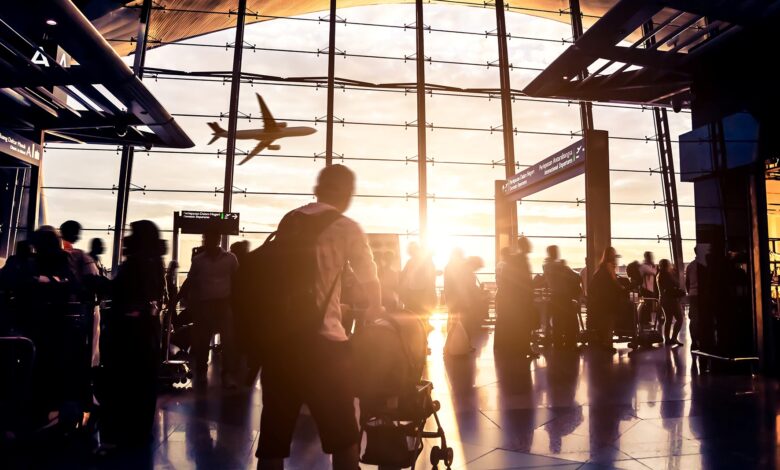
The public discourse around AI tends to fall into polarised camps – those who argue that we should be happy to let technology take its course, and those who are deeply suspicious, or even fearful, of where an AI-powered future may take us.
The public discourse, of course, isn’t always a true representation of how most people actually feel. It’s even less reliable as a predictor of how they’re likely to behave.
We wanted to find out how people felt about the growing role of technology in airport travel experiences. We surveyed 2000 people in the UK who had travelled by air in the last 12 months. What they told us gave us food for thought and, in our view, represent a strong opportunity for airports and their tech partners to reap the benefits of AI and automation.
Six in 10 people say they worry about the security of their personal data when travelling through an airport. That may not be hugely surprising, but it does juxtapose slightly with other findings. In particular:
- Two-thirds of people (66%) say they’d be comfortable with uploading to their phones biometric data like facial and fingerprint scans for the purpose of travelling;
- Three-quarters (76%) say they’d feel comfortable with facial recognition being used as the primary way of verifying individuals’ security information;
- More than one in six (62%) are comfortable about the increasing use of AI in airport processes like security checks, check-in and boarding.
Putting the AI in airports
Digital technology is already a critical part of airport infrastructure, from the increasing use of e-passport gates and border control to body scanners and advanced cyber threat monitoring.
AI is a growing part of the airport experience too, even though it may still be in the early stages of adoption. But it’s an area that’s moving extremely quickly.
New technology will play an important role in smoothing the passenger experience as they move through airports. AI-powered biometric security checks will make border checks smoother and faster, monitor for suspicious behaviour, schedule staff working patterns and highlight potential delays to allow for more tailored human intervention – these are just a few areas where AI can improve the operational effectiveness and security of modern airports.
As always, getting customer buy-in as early in the process will be key to success. The research told us that air passengers are willing to accept increased input from technology. But this green light comes with conditions.
Speed over data security?
We heard some interesting views on overall priorities at the airport. For anyone who’s stood in a miles-long queue at security, or experienced the sinking feeling of a delayed flight, it’s understandable that speed and convenience are foremost in travellers’ minds at the airport. That’s the case for more than half of UK travellers (53%), who rated speed and convenience as slightly more important than overall security (51%) and significantly more important than data security (36%).
From this perspective it makes sense that AI and biometrics are seen as beneficial by so many people. Our feeling, though, is that this is a qualified acceptance of new technologies during air travel. Airports don’t have carte blanche from the travelling public. While they could press on regardless, this may be an opportunity to build consensus so the path ahead is a little smoother.
There remains some uncertainty about airports’ storage and use of personal data. Around a third of people (34%) don’t feel confident that they fully understand the data airports hold on them. About the same (31%) feel either slightly or extremely uncomfortable.
The obvious response to this is that an inverse proportion of people feel much more positively about the question of data collection. While that may be true, we shouldn’t ignore the reticence of a third of air travellers; somewhere around 86 million people according to UK government data.1
The vital role of trust
The good news for airports is that this is not a rejection of technology. It’s clear to us that travellers are open to greater use of technology in return for improved experience. However, our own threat intelligence continues to highlight a persistent rise in targeted attacks on aviation, particularly on passenger data systems, biometric platforms, and third-party integrations critical to airport operations.
This isn’t theoretical: we’ve seen ransomware groups and state-linked actors specifically probing airport defences across Europe.
With the push to a digital paperless experience growing all the time, the sensitivity of the data collected increases its value to hacking groups. Trust in digital travel relies on trust in the security behind it, which means the aviation sector must treat cybersecurity not as a compliance checkbox but as a continuous operational priority.
Changing behaviours
Passenger behaviour is changing too, but their reservations and concerns should be acknowledged when new systems are being developed. As part of our research we also took a slightly more unconventional route. We spoke to people on the streets of Glasgow, in Scotland, where one of our UK offices is based.
From this qualitative feedback, we heard a nuanced picture of acceptance and caution. Acceptance because people understand that today’s world revolves largely around being willing (if not happy) to provide your personal data in exchange for a given product or service; caution because stories of data hacks, online fraud etc are so commonplace that people seem slightly inured to their presence. That doesn’t mean they are ignorant of it.
Trust depends on giving people options rather than forcing them into unknown territory which could be too much, too soon. It needs communication and respect for data subjects – UK travellers, in this case.
If consent is at the heart of this implicit deal with the public, airports have to make explicit their stewardship and respect for the data which air passengers are being asked to provide.
This isn’t new territory since online ticket purchase, downloadable boarding passes and online check in have been with us for many years. But if the industry is serious about using technology to increase passenger speed and convenience, and with them airport profitability and operating efficiency, the complexity of passenger attitudes, behaviours and concerns have to be fully considered.




